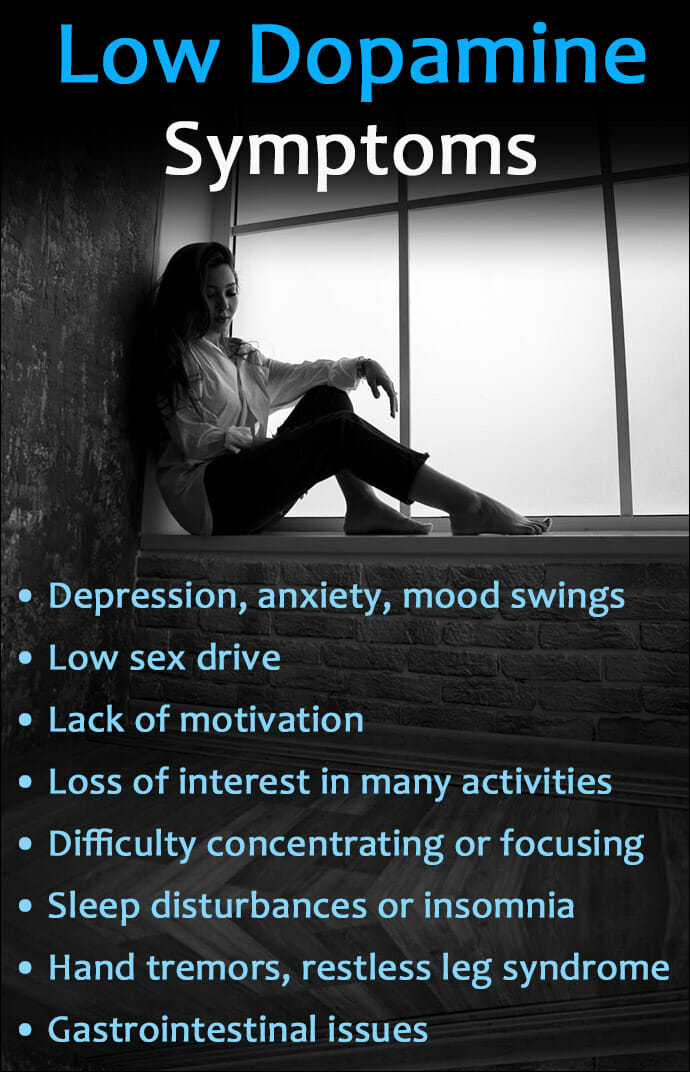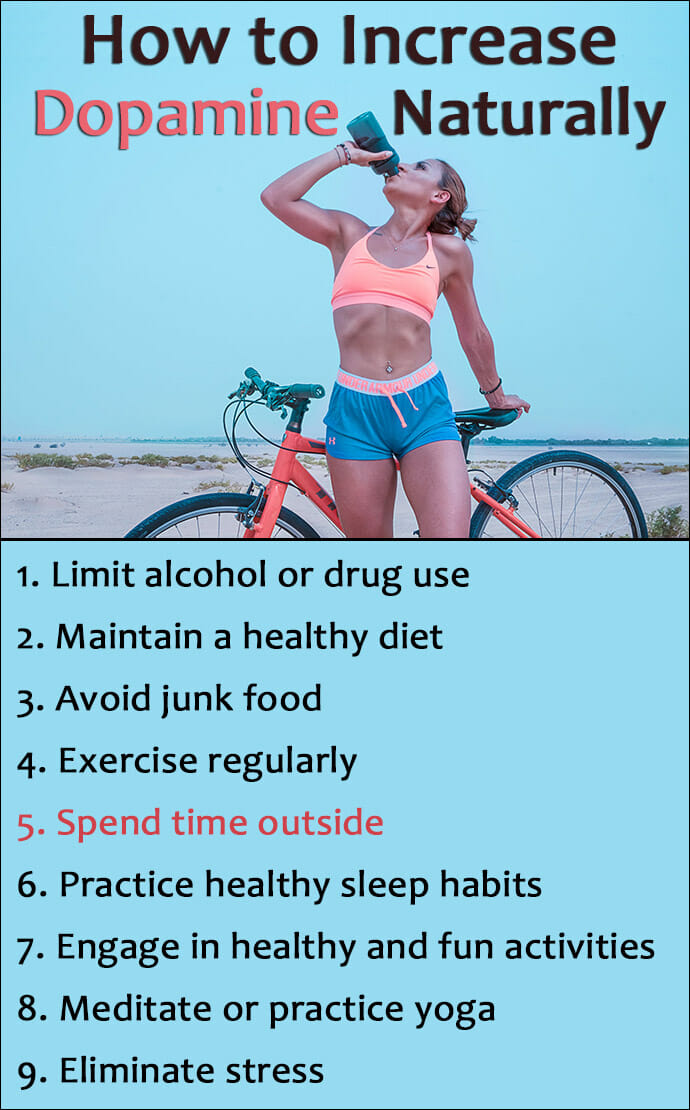Table of Contents
Knowing how to increase dopamine naturally is beneficial for improving mood, motivation, and the way we feel on a daily basis.
Dopamine deficiency has been linked to a number of health issues, such as depression, mood disruption, sleep disturbances, and even struggles with addiction.
Boosting dopamine levels is important for enhancing overall physical and mental health, and it’s easy to do with some simple lifestyle adjustments.
What is Dopamine?
The body naturally produces dopamine, which is both a hormone and a neurotransmitter.
As a neurotransmitter, it acts as a chemical messenger between nerve cells in the brain and the rest of the body. Dopamine is often referred to as the “pleasure chemical” because of its role in the brain’s reward system and function.
In fact, each time we engage in a pleasurable activity, whether it’s having a nice meal, sexual intercourse, or going for a walk, the brain releases small amounts of dopamine that reinforce this type of behavior.
In other words, it lets the brain know that the body enjoyed the activity because it was pleasurable. This can have a positive effect when the activity is a healthy behavior but can have a negative effect when the activity is an unhealthy one, like drug or alcohol use.
Even though dopamine is involved in helping us feel pleasure, many people feel it would be better served by calling it the reward or motivation chemical, than the pleasure chemical.
Dopamine is also considered one of the four “feel good hormones” because it is released into the blood stream to control various functions such as mood, sleep, and motivation, among others.
Why Increase Dopamine – What Does it Do?
Dopamine plays a vital role in functions like concentration, focus, memory, productivity, motivation, and the ability to experience pleasure, so it’s important to maintain optimal levels for overall wellness.
Unfortunately, there are downsides to increasing dopamine by using habit-forming substances, like nicotine, caffeine, prescription painkillers, illicit drugs, or alcohol.
When we use addictive substances, the brain releases a surge of dopamine, which not only causes a person to feel pleasure, but also reinforces that behavior.
This might seem relatively harmless where morning coffee is concerned, but it can be a serious problem when we increase dopamine from things like cocaine, heroin and opioids, or even alcohol.
If the brain is repeatedly flooded with dopamine production from unhealthy activities such as substance use, it will stop creating it naturally and leave a person feeling depressed or anxious.
This can then lead to increased pleasure-seeking behavior, such as using more drugs or alcohol to boost dopamine in the brain to feel good or, as time progresses, to simply feel “normal.”
Healthy activities that increase dopamine naturally reinforces and motivates positive lifestyle choices that continue to produce the “feel good” chemical. It also helps improve issues like stress, anxiety, functional depression, sleep, and many others.
Low Dopamine Symptoms
Low dopamine deficiency in the body can produce symptoms that lead mental health issues and a poor quality of life.
Typical Low Dopamine Symptoms Include:
- Depression, anxiety, and mood swings
- Low sex drive
- Lack of motivation
- Loss of pleasure in experiences and people once enjoyed
- Difficulty concentrating or focusing at school or work
- Sleep disturbances or insomnia
- Hand tremors, as well as restless leg syndrome
- Gastrointestinal issues, such as constipation
The severity of the symptoms can vary among individuals and may be related to the root cause of the deficiency, such as whether the symptoms are related to substance abuse or medical reasons.
Short term issues may be mild, while a chronic deficiency that leads to major depressive disorder symptoms is more concerning.
Causes of Low Dopamine Deficiency
There are several different reasons why a person may experience low dopamine deficiency.
Some medical conditions like Parkinson’s disease or schizophrenia may cause a dopamine deficiency.
A traumatic brain injury can damage areas of the brain that produce the neurotransmitter.
Other reasons for a Low Dopamine Deficiency Include:
Substance Use and Abuse
Drugs and alcohol can cause a surge of dopamine, and the brain will naturally reduce production of the neurotransmitter, leaving a person feeling depressed, anxious, or overwhelmed.
This lack of dopamine production can lead to dependency and addiction where some substances are concerned, because the brain relies on them to feel pleasure.
Using multiple drugs at the same time, known as polysubstance abuse, can severely alter dopamine production.
Finding ways to increase dopamine naturally is a much healthier choice.
Poor Diet and Nutrition
Diets with too little protein containing tyrosine, an amino acid, can lead to dopamine deficiency.
Lean proteins combined with fresh fruits and vegetables are a good way to maintain a diet that is good for overall health and will increase dopamine naturally.
Some Prescription Medications
There are some medications that can lower dopamine levels, such as antipsychotic prescriptions or antidepressants.
These drugs are known to bind to dopamine receptors in the body, which may lower the natural production of the neurotransmitter.
Certain types of anti-anxiety medication increase dopamine while others lower levels in the brain.
How to Increase Dopamine Naturally
Learning how to increase dopamine naturally is easier than most people think. In fact, many people might already be engaging in some of these activities and not even know it.
What’s even more interesting is that practicing healthy habits to increase dopamine are reinforced by the reward and motivation benefits of the neurotransmitter itself.
9 Ways to Naturally Increase Dopamine Levels
1. Avoid overindulging in alcohol or recreational drug use
While occasionally having a glass of wine or using cannabis may not have a negative impact on some people’s lives, others struggle with moderate use of drugs and alcohol, which cause a surge of dopamine.
In some cases, treatment for a substance use disorder can help people get back on track and restore healthy levels of dopamine during recovery.
2. Maintaining a healthy diet can increase dopamine levels
A healthy diet rich in fresh fruits and vegetables combined with lean proteins, such as fish, eggs, chicken, and other poultry that contain tyrosine will help increase dopamine levels.
Other foods known to contain tyrosine include avocados, peanuts, oats, leafy green vegetables, watermelon, and olive oil. Many of the same foods that increase serotonin levels will also work for dopamine.
3. Avoid junk food
Junk food can cause a small but temporary surge of dopamine. This reinforces the body’s desire to consume unhealthy snacks that cause a spike and crash of the body’s blood sugar levels, along with dopamine.
4. Exercise regularly to increase dopamine
Getting regular exercise is always on the list of things that make life better, and it’s no different when it comes to dopamine. Just a brisk 30-minute walk every day can lead to healthier levels of dopamine.
It may seem challenging at first, but establishing a regular exercise routine is easier than many people think, and the pleasurable release of dopamine from the activity will reinforce the behavior.
5. Spend time outside
Spending time outside is easily paired with exercise, especially during the summer and spring months when the weather is nice.
At least one study has shown that people who had more time in the sunlight had an increased number of dopamine receptors, compared to those who got less time in the sunshine.
6. Practice healthy sleep habits
Practicing healthy sleep habits can be easier said than done, and most people need 7 to 9 hours of sleep a night for healthy brain functioning.
Establishing a pattern of going to sleep every night at the same time and getting up in the morning at the same time, even on the weekends, allows the brain and body to receive the required rest it needs to produce healthy levels of dopamine.
7. Engage in healthy, pleasurable activities
Obviously, this will vary for each person but engaging in healthy and pleasurable activities will naturally increase dopamine to benefit the mind and body.
These activities include things like hiking, spending time with family or friends, learning a new language, playing a musical instrument, or even listening to music.
8. Meditate or practice yoga
Meditating or practicing yoga quiets the mind and provides much needed relief from stress.
There is research that suggests meditative yoga does increase dopamine production and modulates synapses in the frontal cortex of the brain.
9. Eliminate as many life stressors as possible
Chronic stress wreaks havoc on our life and is often a key driver of unhealthy behaviors, such as alcohol and drug use that leads to dopamine deficiencies.
It’s not always easy to eliminate stress on our own. Seeking counseling or therapy can help identify, alter, or remove stressors from our life to increase dopamine levels that improve the way we feel.
Most of these suggestions for how to increase dopamine are easy to incorporate into daily life and offer the benefits of better mood and mental health.
For those who have low levels due to substance use, drug or alcohol treatment for addiction may be necessary to get back on track with a healthier lifestyle.
Frequently Asked Questions
What does dopamine do in the brain?
Dopamine is a neurotransmitter that acts on the brain’s cellular communication system to control mood, pleasure, motivation, and other functions.
As a reward mechanism, it is released during pleasurable activities to encourage repeating the behaviors to feel good. Unfortunately, it does not understand the difference between healthy activities like exercise, or unhealthy ones such as drug use.
It enhances motivation and learning by producing positive feelings after accomplishing goals.
Dopamine plays a role in motor control and movement, which is why low levels are associated with Parkinson’s disease.
It has a positive influence on regulating mood, sleep, focus and concentration, and mental health.
How do low dopamine levels affect mental health conditions like depression?
Because it is responsible for motivation and pleasure, a person with a dopamine deficiency will struggle with low energy, decreased motivation, and not be able to experience pleasure.
All of these symptoms result in low mood that is strongly linked to depression and other mental health conditions.
What is the fastest way to release dopamine?
The fastest way to release dopamine is to enjoy pleasurable activities, eat certain foods, and move your body, especially outdoors.
Here are some effective methods that work quickly:
- Exercise vigorously
- Listen to your favorite music
- Meditate or practice mindfulness
- Eat high protein foods
- Complete a goal to receive a feel-good reward
- Spend social time with friends
What are some foods that increase dopamine?
Lean proteins and tyrosine-rich foods are excellent ways to boost dopamine production. These include:
- Salmon and tuna
- Eggs, cheese, and yogurt
- Chicken, turkey, and beef
- Oatmeal
- Black beans and lentils
- Almonds, walnuts, and pistachios
- Seeds like pumpkin, sunflower, or sesame
- Avocados
- Apples, oranges, and bananas
- Green tea
- Dark chocolate
Are there certain types of drugs that increase dopamine?
There are many types of prescription drugs that increase dopamine levels to treat conditions like Parkinson’s disease, ADHD, and depression. Some examples include:
- L-DOPA (Levodopa) for Parkinson’s
- Methylphenidate (Ritalin) for ADHD
- Bupropion (Wellbutrin) for depression and smoking cessation
Illegal stimulant drugs like cocaine and amphetamines can significantly spike dopamine levels and can be highly addictive.





